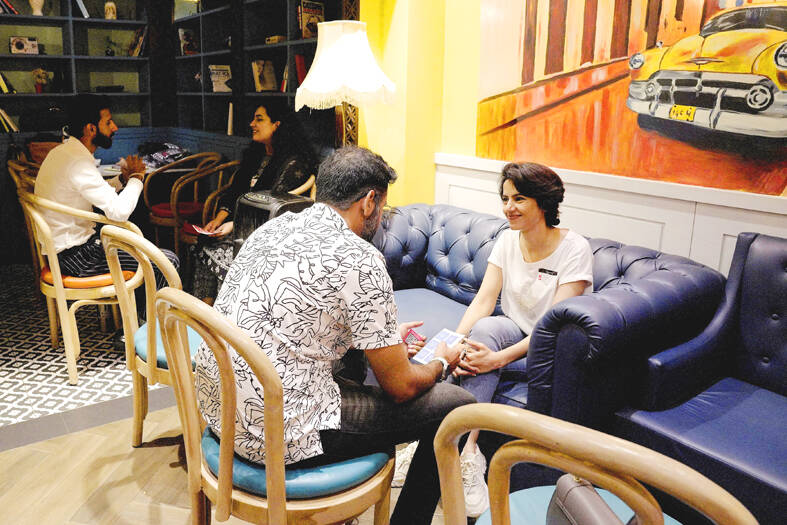Dozens of young singles gathered this month to meet potential marriage partners in Pakistan’s eastern city of Lahore, the first attempt by a UK-based matrimonial app to help people find spouses in person in the conservative Islamic country.
Typically, marriages in Pakistan are arranged by parents who look for suitable matches for their children from within their communities or the extended family. Dating apps are generally stigmatized and gender segregation socially and at work remains common in the country of 240 million people.
The Lahore event was organized by Muzz, formerly Muzzmatch, which said its app is based on Islamic etiquette.

Photo: Reuters
The app is restricted to Muslim users, and, in a nod to traditional values, gives the option of blurring pictures except for specific matches and allows for chaperones to oversee meetings.
Other smaller events are also emerging in the country to challenge traditional matchmaking norms.
Despite criticism online in the past for the app, the Muzz event was attended by about 100 people.
Aimen, a 31-year-old woman who did not want to be further identified, said she used the app on the recommendation of her US-based brother.
“I used the app for two weeks, but then I saw an ad for this event and thought, why not meet people in person?” she said.
Her mother would have accompanied her as a chaperone, but could not attend because of her health, she said.
Muzz, launched in 2015 in the Britain, which also has a sizeable Muslim population, has more than 1.5 million users in Pakistan, its second-largest market after Morocco.
Moaz, a 27-year-old man, said he has been using Muzz for a year and that he was hopeful of finding a wife through the app.
“I do get matches, but they have different priorities,” he said, adding that girls on the app expect him to involve his parents from the beginning.
“That is not [immediately] possible,” he said, stressing the need of getting to know someone before taking the next big step.
Annie’s Matchmaking Party, another Lahore event last week, used an algorithm to match 20 young professionals after a selection process and invited them to the meet.
Noor ul Ain Choudhary, the 30-year-old organizer, faced criticism online that her event promoted a “hookup culture.” She countered that it aimed to provide a safe space for singles to meet and connect.
“In Pakistan, we’ve had two options: biased arranged marriages or time-consuming dating apps with no guarantees. Safety during meetings is also a concern,” she said.
Abdullah Ahmed, 22, was bullish about in-person events and said he was convinced he may have found his perfect match at the Muzz gathering.
“The highlight was meeting an amazing girl,” he said, beaming with excitement, adding that they instantly clicked and swapped social media handles.
“We’re both Marvel fans. We’re already planning to catch the new Deadpool & Wolverine together,” he said.

VAGUE: The criteria of the amnesty remain unclear, but it would cover political violence from 1999 to today, and those convicted of murder or drug trafficking would not qualify Venezuelan Acting President Delcy Rodriguez on Friday announced an amnesty bill that could lead to the release of hundreds of prisoners, including opposition leaders, journalists and human rights activists detained for political reasons. The measure had long been sought by the US-backed opposition. It is the latest concession Rodriguez has made since taking the reins of the country on Jan. 3 after the brazen seizure of then-Venezuelan president Nicolas Maduro. Rodriguez told a gathering of justices, magistrates, ministers, military brass and other government leaders that the ruling party-controlled Venezuelan National Assembly would take up the bill with urgency. Rodriguez also announced the shutdown

Civil society leaders and members of a left-wing coalition yesterday filed impeachment complaints against Philippine Vice President Sara Duterte, restarting a process sidelined by the Supreme Court last year. Both cases accuse Duterte of misusing public funds during her term as education secretary, while one revives allegations that she threatened to assassinate former ally Philippine President Ferdinand Marcos Jr. The filings come on the same day that a committee in the House of Representatives was to begin hearings into impeachment complaints against Marcos, accused of corruption tied to a spiraling scandal over bogus flood control projects. Under the constitution, an impeachment by the

Exiled Tibetans began a unique global election yesterday for a government representing a homeland many have never seen, as part of a democratic exercise voters say carries great weight. From red-robed Buddhist monks in the snowy Himalayas, to political exiles in megacities across South Asia, to refugees in Australia, Europe and North America, voting takes place in 27 countries — but not China. “Elections ... show that the struggle for Tibet’s freedom and independence continues from generation to generation,” said candidate Gyaltsen Chokye, 33, who is based in the Indian hill-town of Dharamsala, headquarters of the government-in-exile, the Central Tibetan Administration (CTA). It

A Virginia man having an affair with the family’s Brazilian au pair on Monday was found guilty of murdering his wife and another man that prosecutors say was lured to the house as a fall guy. Brendan Banfield, a former Internal Revenue Service law enforcement officer, told police he came across Joseph Ryan attacking his wife, Christine Banfield, with a knife on the morning of Feb. 24, 2023. He shot Ryan and then Juliana Magalhaes, the au pair, shot him, too, but officials argued in court that the story was too good to be true, telling jurors that Brendan Banfield set